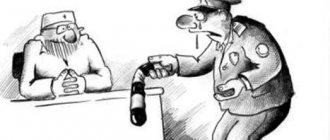Over the past few years, prison slang has become part of the everyday speech of many people. This happened partly due to the popularization of such a category of people as “gopniks”, partly due to the harsh conditions of the current reality, where ordinary laws often no longer work, but thieves’ laws are quite capable of instilling morality and hard work in a person. What does it mean to live according to concepts and is it really as bad as it seems? A lot of people are familiar with thieves’ ideas, and they also support them quite often. What are these people right about and what are they wrong about?
When did thieves' laws appear?
“Thieves” concepts were formed over quite a long time, starting from the 30s of the last century, when the authorities actively began to fight thieves and criminals, one after another putting them behind bars for even the slightest offense. In response to such aggressive actions of the state, criminals rallied into more organized groups, where there was a certain order and set of rules, violating which a person became a traitor. It was that period of time that influenced the formation of the basic laws of the criminal world. Everyone mainly traded in theft, for which they were sent to a zone where “brothers in mind” taught people to live according to concepts.
The so-called elite of the criminal world appeared - thieves in law, “their own” people in positions in law enforcement agencies, who, if necessary, “protected” their comrades, since they had great privileges and some connections in high circles, since thieves’ ideas do not allow cooperation with any government agencies.
The criminal world underwent many changes during the Second World War, when many prisoners went to the front to defend their homeland, for which they were nicknamed “bitches” and forever branded as traitors, therefore, after the Great Patriotic War, another war took place in Russia, this time between prisoners. One side explained to those who had gone to the front what it meant to live according to concepts, while the other, the so-called “bitches,” took the path of correction and collaborated with the administration. This order in the zone remains to this day.
Basic provisions of thieves in law
Anyone who has at least once encountered representatives of the criminal world is familiar with the concepts of thieves, since they underlie the behavior of any criminal. What does it mean to live according to thieves' concepts? This means following a number of rules, being an honest and decent person. Naturally, in their own circles.
Among the many laws, 7 main points can be identified, from which many others follow:
- Support "thieves' ideas." Stand up for your own people.
- Never, under any circumstances, cooperate with government agencies and law enforcement agencies. Do not testify, do not testify against yourself or someone else, do not admit guilt when convicted.
- Be honest with each other. All criminals are brothers, and betrayal in the family is unacceptable, otherwise the person will simply be oppressed or killed.
- It is important to constantly attract new members into your community. Preferably young people, since they are more capable and understanding.
- It is prohibited to engage in political activities. Not be a party member. Do not deal with documents, do not register at your place of residence, do not work.
- Maintain subordination, establish the power of thieves in law in zones, in pre-trial detention centers and correctional facilities. Authority in the criminal circle is gained by those who have more life experience, who have served time in prison more than once, periodically serve time in prison for crimes and do not work alone, and actively interact with those who are free.
- You definitely need to know how to play cards. Do not cheat in the game for money, you can get it for it.
Many other concepts follow from these concepts, for example, such as maintaining order in the zone, resolving conflicts, collecting tribute from those in prison, and so on. What does it mean to “live according to concepts”? Follow these rules if you manage to get into such a social circle.
Thieves' concepts
THIEVES IN THE LAW
@voryvzakone
Thieves' concepts are unwritten laws - so they say, but they begin to be learned from elementary handwritten sheets of paper.
The law applies to the entire criminal world, starting with camps and prisons, where the lads deliver “heat” and thieves’ persecutions, and ending with freedom, where they also live according to thieves’ laws
Thieves for people
Is someone going to divide the thieves' law into a prison law and some other law?
In thieves' terms, there is no prison law - this is a delusion for which you can answer by spreading it! Thieves' concepts and laws can only be divided into thieves' and human's - and there are no others!
All thieves' laws and traditions began with prisons and camps. But in camps and prisons, not everyone can strictly adhere to the thieves’ idea, where the fundamental meaning is to resist any regime or propaganda that runs counter to the ideology of the thieves.
Not everyone will die for a thieves' idea. Lawyers understand this very well. Let’s go further and look at what is learned at the very beginning of the thieves’ law, so that you can understand what human things are:
According to thieves' concepts, 90% of the population of prisons and camps are men.
According to thieves' laws, there are only two suits - thief and man.
According to thieves' concepts, no one should live according to edges and regions, but only according to suit.
Whoever walks with the garbage in one step is the fucking one.
From here it turns out that if they live differently in a camp or prison (red lawlessness, block system), then it’s f...ing.
A thief in law can put an end to such a camp, and prisoners who arrive from there on a thieves' move will be severely punished, since every prisoner must know the above laws.
Damn...skim - a thief can declare both the entire camp and an individual person - damn...other, usually this is the chairman of some section, who is the main goat.
According to the thieves , a real hunt begins in the prisons and camps of the CIS for someone who is declared fucking different, and they will be waiting for him in freedom. Usually the lads meet such a person near the camp, where the officers no longer care about him, and then they take him out and kill him.
The last case that I remember well: they did not touch the goat, since his mother was there to meet him, only a month later in his homeland his legs were broken, making him disabled for the rest of his days. They treated him humanely - they did not kill him.
According to the thieves’ laws of the early 2000s, “we shouldn’t punish, so as not to become like the redfins”
Every decent prisoner, when meeting a whore, must kill him; if he fails to kill him, then he must mark him with a blow to the face with a knife or sharpener.
Since 90% of prisons and camps consist of men, for those who understand the idea of thieves, one of the points sounds like this:
A boy, a punk, a zhigan - lives by the interests of a man.
But, man, there are differences between men, and everyone understands this, so in the criminal world the past is not forgiven. If a person has even a minor nuance in life, then the attitude towards him will be appropriate.
There are many nuances and irregularities “in life” and you can list them until the next Chinese Easter. The main thing that a man who does not aspire to become a thief in law should have:
- He should not be a nepotism, he should not keep pace with the garbage.
- Should not be patient at will.
- He shouldn’t be in prison under a dumb law.
- When free, he must not work in security, police, or fire departments—and must not wear other shoulder straps.
- Must not be a member of any political parties.
- The main thing is to support the thieves' idea.
Of the 90% of the population of prisons and camps, there will be few who strictly comply with these points.
Anyone who understands the thieves' idea must treat others loyally (strictly according to concepts), and even more precisely, in a human way - this is what is human. But when you have to choose, the lads always take the side of a decent guy. And the rest, who have a “tail to Magadan”, are treated like human beings - they benefit decent men and lads.
Thieves' idea
Anyone who begins to learn the thieves' idea, in fact, takes a very difficult path: he gets tired morally, physically, risks his life, especially in freedom, and is obliged to unwind if in a camp.
Not everyone can stand it, hence the saying from operas “a thieves’ life is short.” In fact, “blatnoy”, “blatnye”, “blat” and all derivatives, words with the same root from the word “blat” do not exist in thieves’ terms.
That is, the word “blatnoy” means absolutely nothing, and therefore has no weight in the criminal world!
There are only punks, lads, bosota - these are those who have a future to become a thief. And the word “blatnoy” is used in everyday life, but no one will hear such a thing on the gangway.
To become a thief, in addition to crystal purity, a shpanyuk must have personal qualities:
- To be able to convey a thought to any, even the most difficult person, without raising your voice (raising your voice, the tone is an insult) requires self-control.
- Organize something: a game, a gangway, a throwover, etc.
- To independently put an end to some problem: the fate of a person, a camp - this is decisiveness, since such cases are considered from the outside “under a microscope”, you cannot make the slightest mistake.
- Conduct business independently: barracks, camp, region, etc.
- Shpanyuk must speak well and convincingly - I have never seen it be otherwise, of course, if he is not an “infantryman”.
Shpanas, barefoot, lads - these are also strictly men according to thieves' concepts, but they are called differently: boy, stirrup, denied.
Each of them can become a thief. Starting their journey, they learn to win over the men, and then more - to win over the cops.
Each of them must be fluent in the languages of thieves - these are Fenya and Murka, where sometimes with the help of one gesture you can explain, for example, what color a person is, why he came, what his past is and other details.
The main tasks of barefoot are to cognize and disseminate.
To sow what is human and thieves is the main task of thieves’ concepts.
The thieves' idea is the denial of everything garbage, unity and cohesion - as one whole!
Life by suit
Life by suit - how is it? If they begin to live differently - according to edges, regions, nationalities or some other social or religious affiliation, then a split occurs in the camp, where everyone is at gunpoint, where only one’s own or someone else’s is present.
This is called a "block" or "block system". This often happens when they live in a community, or the camp falls under the influence of some group that does not know how it should be according to thieves’ concepts.
The camp is torn apart into barracks as clans, fellow countrymen and other groups confront each other.
The “porridge” continues for the time being, until the office takes over, driving everyone onto the parade ground with armored personnel carriers.
According to thieves' concepts, there are no nationalities, countrymen and other distinctive attributes of a person that do not relate to the thieves' idea. Everyone is equal, and if someone thinks differently or, God forbid, emphasizes to someone, then he will answer in life on the gangway.
How they ask according to thieves' concepts
The demand for concepts can be cruel, but here a person, as a rule, understands what can await him, so it is only his choice. A person can only be killed by decision of a gathering of thieves; often he is a whore who will be caught sooner or later.
Such a final verdict is rarely made among one’s own people; they are often “corrected.” How to correct it - at the end of the gangway, the person must realize it, then they give it to him in the ear.
Corrections are mainly made for misdeeds; no one gets off so lightly for serious actions.
Serious actions according to thieves' laws
An act in the world of thieves is already serious, it is definitely at least a tail. There are only two actions, again strictly according to the laws of thieves:
- Fucking - against a thief, a thief, said by a thief. Stealing is not discussed, otherwise it’s fucking… and the name is given to whore, fucking… ina.
- Gadsky is against the people, people can decide here - punks, barefoot. The name is reptile, reptile, because disgusting.
With the first case it is clear - a person consciously goes against the thieves’ concepts, which ends in his death.
Nasty is when a person goes against his own people or does something inappropriate, or harms someone. Each disgusting act is given a name, here are some of them:
- Rat - stole from his own.
- Mouse - did not inform, thereby causing harm.
- Schemer - weaves intrigues, often pitting people against each other.
- Zmeyskoe - harbored a grudge, waited and took revenge.
- The fuflyzhnik lost, didn’t pay.
- Hooligan - fought, sorted things out not in the order of the gang.
- Makhnovshchina - shaggy people take something, rob prisoners.
Of course, you can’t tell everything, especially since you can truly understand what a thieves’ idea is only when you stew in it.
Take my word for it that you need to remain human in any situation, even if you are beaten from morning to evening like your own donkey, remember that you are not a donkey, but a man.
A person should live like a human being, right? Then the only opportunity in prisons and camps today is to live according to thieves’ concepts.
Common Mistakes
Some sources on the Internet claim that there are thieves’ and prison laws, I repeat that there are no prison laws, if the authors mean “human”, then from here there are many errors in the definition and not only, I’ll say the main thing.
For example, under the first paragraph “in the prison law” Wikipedia says: allocating a share to the common fund is not so, there is no such thing. The only men in prison are poor fellows, the thieves in law know this very well, the men, on the contrary, are allocated from the common fund, but how is it? I quote
“The common fund is a voluntary matter”
Can we say that the laws of prison are human?
No, since they adhere to human rights even in freedom, not all prisoners can live according to the thieves’ way of life.
The majority of former prisoners and those who are free continue to support these “prison laws”, since they do not know the true thieves’ traditions, or do not have the right to live by them.
I wrote above that there are only two suits - thief and man .
They live by color, and not by age, region, shoulder straps, regions, and so on, hence the second mistake of Wikipedia, which elderly teahouse owners and other scumbags go crazy over - this is to honor elders, there is no such thing in sight, why should we honor him - because he is gender washes for 40 years?
The next point is to honor your parents, of course this is sacred and comes first for many prisoners, but this is a personal matter for each prisoner; most of the prisoners do not know their parents at all.
In general, the personal is never put ahead of the general, your personal, if it goes against the general, the thieves, the human, then there will be problems, at a minimum. You can believe in anything, but... until there is obvious harm to the general situation.
PS There is a clause in the thieves’ law that says: “Do not arm the unworthy, do not sow theft among those who are not given.”
Read similar materials:
"High security zone"
“How to live in prison? By law or by concept?
“What kind of tattoos can they ask for in prison?”
“What is Press-khata - chaos in prison and zone”
“How do Slavic thieves in law differ from Caucasian thieves”
“Zon’s rosary interchanges”
“The policeman in the zone and at large, who is he?”
"Drugs in Prisons"
Subscribe to the channel THIEVES IN THE LAW: https://t.me/voryvzakone
Subscribe to the channel THIEVES IN THE LAW: https://t.me/voryvzakone
What do people do in prison?
Once in the zone, a person, one way or another, finds himself under the influence of generally accepted concepts, which he is obliged to observe, but at the same time he is allowed some freedom of action regarding his hobbies, as long as it does not offend others. In prison, many authors wrote their books, composed poems, most “prisoners” have their own hobbies, and, as a rule, no one meddles in the affairs of others, but if he says something against someone else, he will get what he deserves for it , because “you need to be responsible for the market.” In general, most criminal phrases have a deeper meaning than it might initially seem. The prison administration is also familiar with thieves’ concepts, and it will not be possible to “leave” through legislation. Since concepts exist in parallel with laws, and sometimes are even placed above laws, therefore, in order to survive in this habitat, it is necessary to feel the boundaries that cannot be crossed.
There are also two types of colonies. Some do not work and are on unpaid leave, while others prefer to do some kind of work. On the territory of the prison there may be entire workshops for sewing clothes, baking bread and much more. In general, it is “dirty” and thankless work.
Who should I turn to for justice?
Under no circumstances should you try to punish the offender yourself - for this they usually kill you in the zone. The thieves perform the function of protecting the thief, and the person who has been treated unfairly will not even have time to lay a finger on the authority.
In a normal environment, if a person is offended by a manager, it is necessary to report the violations to his superiors. In the zone and in prison, if, for example, the guard acted out of line, it is necessary to write a note - a small letter - or personally tell the guard about the incident.
In today's prisons, the division into “red” and “black” zones is no longer so sharp. The former previously included those correctional institutions in which many prisoners cooperate with government officials. Secondly, this was categorically unacceptable for those under arrest.
However, in both cases, any contact with government officials, especially with the transfer of information about internal prison affairs and showdowns, is punishable. Therefore, you cannot turn to the prison or zone administration for help. Those who complain to prison authorities risk their health and even their lives.
The administration itself usually prefers not to interfere in the affairs of prisoners, since order is largely ensured through internal prisoner subordination. Among external contacts, the non-statutory code of laws allows letters to a lawyer and relatives.
Beatings and abuse are commonplace in places of detention. It is through them that a strict system of hierarchy is maintained, and the law of thieves rests on them. So anyone who ends up in prison there needs to completely change their point of view on such things as justice and human dignity.
Show comments
Discussion
How concepts work
It should be borne in mind that in everyday life and in prison jargon the concepts are often radically different from what thieves on the street mean. Society actively borrows some words from prison jargon, blurring the entire original meaning of the coined terms. People serving sentences actually have a completely different language; they speak mostly jargon, and they remember what it means to live according to the concepts in the zone in the first months of their stay in the colony.
Why is there such a word “concept”? What is the original meaning of it? The concept - because it should be clear to everyone. If a person begins to “push forward” a long philosophy and try to convince someone that he is wrong, using concepts and turning facts upside down, roughly speaking, “pouring water” and “powdering one’s brains,” then the matter is unclean. Long rants are not typical for people who live by the concept that the simpler the explanation, the better.
These laws work in prison because there is a need, but by what concepts do the “gopniks” who have never been in prison in their lives live? The answer is very simple: according to people. Acting like a human means not exposing loved ones, not stealing, and respecting your family and mother. Some “gopniks” for some reason still prefer not to work under any circumstances, and not at all because they fight the system and the state so much, but because there is such a concept. Or they have vaguely heard about this.
Boy's companies
Each street group had its own territory, and protecting it was one of the main tasks of the company. Surely each of the guys at least once in his life found himself in such a situation when a gang of aggressive-looking peers asked him with a challenge: “Which area are you from?” The defense of “one’s” territory was also regulated by a whole list of rules.
The first and main rule sounds like the famous motto of the musketeers from the novel by Alexandre Dumas: “One for all and all for one.” If a boy became the target of an attack, he could count on help and revenge from his comrades. It is noteworthy that even here there was an order: either the strangers were “shot down,” i.e. they indicated the time and place for a fight, or forays were made into enemy territory in order to take the offenders by surprise. At the same time, the boys behaved nobly to some extent and even during revenge raids they did not attack individuals.
How to communicate with such people
The so-called “gopniks” are people who live according to concepts. These are mainly young people who are close to the criminal world or have a direct connection to it. But most often, criminal behavior has nothing to do with the attitude of these people to the world of thieves; in other words, they borrow someone else’s jargon and use it as they see fit. If you ask them what it means to live according to concepts, the answer may be indistinct muttering and a weak explanation of their views. The fact is that thieves’ ideas are different and people interpret them in their own way, which creates certain disagreements, and each person may have his own concepts. So what concepts do Gopniks live by in the end? Their blurred view of the world and discipline often has nothing in common with organized crime and the hierarchy that exists in the criminal world.
When conducting a dialogue with representatives of this social stratum, you should be careful in your expressions, and, in principle, not talk too much. To the question: “By what concepts do you live?” the answer is quite obvious: according to human ones, like all people. Any unnecessary word can provoke a conflict.
Another rather favorite question: who are you in life? The main thing here is not to start mumbling and answer clearly, to make it clear that you can stand up for yourself. The more insecure a person behaves with representatives of this group, the easier it is to make a victim out of him.
Life “according to concepts” and without
Often you have to deal with those who live by “concepts”. This blog will not talk about prisoners who somehow honor or adhere to their unspoken rules.
As far as I remember, a turbulent life in terms of concepts among society and youth began to bloom and smell after the collapse of the Soviet Union, when values from the criminal world replaced communist values in the resulting vacuum in inquisitive minds. I will also not describe this procedure in detail, but I would like to dwell on some contradictory facts of life according to “concepts” among young people.
As G. Golovkin said in his interview, in his youth he often had to fight in his city. Perhaps this fate befell all the youth of that time. Along with this, “concepts” were actively instilled in young people.
I was not familiar with the policy of “double standards” at that time, and it somehow turned out strange when one of our peers, who kept repeating to everyone “about the dangers of the concept of red showdowns and the correctness of showdowns over black ones” and in every possible way provoked many to “get into black showdowns” with him (that is, for a fight, usually weaker and younger), they knocked on their brains in one of the nightclubs in our city. We all then expected a “black answer” from him, but it turned out strange when he turned, then still to the police, with a statement against his offenders. And when the grandmother went to the police to confront the offenders of her beloved grandson.
Then the adherent of “life according to concepts” explained his “red movements” by the fact that his parents forced him to write a statement; if it were his will, “he would deal with them in black and white,” we willingly believed in him.
The second fact that runs counter to “life according to the rules among the boys” was the fact when they did not return the monetary debt to me))). That is, before borrowing it from me, a follower of such a life told me that he “would be a whore” if he did not return the money. Accordingly, he did not return the money to me and in the next conversation about mentioning his whoredom, he was offended and, according to concepts, I was challenged to a duel.
The third fact was when the “duelists” after the “black showdown” began to write statements to the police against each other about receiving and inflicting injuries. This seemed to go against the instilled “concepts” among young people.
And according to all the facts, the persons who violated the principles of the “concept” did not consider themselves apostates of the holy faith and continued to assert to others that only he was the true tenant of the concept. It becomes especially alarming when some law enforcement officials advocate for living “by convention,” calling victims in a criminal case “patients,” saying that “by convention” you are wrong for filing a complaint with the police.
I began to move away from life “according to concepts” in adulthood, when I realized that the concepts of such laws are not written in any way and are not regulated by anyone and are interpreted by everyone in their own favor. How do I live now?
Silently enjoying life. At any time there is a danger to the life and health of family and friends, I dial 102 on the phone. In general, I don’t react to insults and curse words from drunk and not drunk people. I do not drink alcohol in public places.
Quite often I read and hear that you can’t live like this, that you need to be able to stand up for yourself. For such people, there is only one answer: in peacetime, I live according to the laws of the state and obey them, and those who use “concepts” in their everyday life are hypocrites.
After all, if they become involved in an accident or a crime is committed against them or their relatives, in which they will act as victims, they will first of all dial 102 and call the police.
It is painful to look at such young people who destroyed their destinies with their own hands, who became victims of circumstances and for whom false values were important at that time.
I wish everyone to get through this period of time as quickly as possible and not fall into the net of such values.
Why has it become popular to be a bandit?
In principle, little was known to distant people about the criminal world; at least in the pre-war period, no one went into detail about how the hierarchy was built in the society of those who knew how to live according to concepts. The rules of the criminal world became public many decades later, and already in the 90s the laws on which the criminal world was built were most clearly formulated.
At the beginning of the twenty-first century, films with criminal themes were released, where the realities of the underground world were shown in all their glory. The serial film “Brigada,” which has become a cult favorite in Russia and tells about authorities in the criminal world, made a strong impression on young people. Then the film “Boomer” came out, which also did not go unnoticed. In Russian cinema, in principle, the topic of confrontation between the police and the criminal world is raised quite often, which is reflected in the views of the population as a whole, because it is there that it is shown in most detail what it means to live according to concepts.
Many believe that the criminal world of mafiosi and the criminal world of thieves are intertwined, since both people have basically similar views on life, but there is a colossal difference between them in actions and methods of survival. A good example of this is the crime saga “The Godfather”.
Contradictions in laws
Criminal groups for the most part do not behave aggressively towards ordinary citizens, but if it happens that they decide to rob someone in a dark corner due to lack of money, then there are no laws or references to their own moral rules by which they live , it will not be possible to convince. For many who are aware of what it means to live according to concepts, there are, as a rule, only their own principles, which, if desired, and at any opportunity, the criminal will interpret in a way that is beneficial to him, but not to his victim.
Therefore, although there are some vague ideas that thieves’ ideas are actually honest and noble, this does not negate the fact that people who have been in prison give themselves the right to behave as they want. “Gopniks” differ from real people in prison in that they are mostly poor young people who see some kind of coolness in all this behavior and set of rules and try to apply it in everyday life. In real circles, such behavior is not respected at all. This is called "posturing." A person who has not been to the zone is not considered “one of our own”.
Hearing their jargon, many questions arise, the answers to which sometimes cannot be found even in a dictionary. For example, who is a “fraer” in thieves’ jargon? This is a favorite appeal to their “victims”, which emphasizes the enormous difference between people from the zone and those who are simply trying to live an ordinary life.
Guys
The image of such a guy was idealized, he was a kind of knight of the streets who achieved success in life because he followed certain unwritten rules. The boy was obliged to “be responsible for the market,” that is, he had to be ready to defend his words on any occasion and always fulfill his promises. This is where the saying “The boy said it, the boy did it” was born. It was unacceptable for him to show cowardice; he was always ready for a fight and the difficulties of life.
Typically, children took their first steps in such a microsociety from the age of 6-8, when they were already more or less aware of themselves in the environment. The romanticization of boys made their image very attractive, they became objects to be emulated.
The hierarchy was very strict - the right to be called a boy had to be earned. After this, the holder of such a title was no longer allowed to perform actions that were “zapadlo”, or to do them unnoticed by others. At the very beginning of a boy’s development, a one-time violation of the rules could be forgiven and simply explained that this should not be done, but if he was caught violating again, he was expelled from the society of boys. Which deprived him of many opportunities associated with this.
An important attribute was appearance. Unlike the subcultures of punks, rockers or rappers, the boy had to dress neatly. Some items of clothing or accessories were a sign of belonging to a specific group, and if they were used by one of the boys who did not belong to the group, a meeting with its members could end badly for him. For example, in 2006, young people determined belonging by the color of items of clothing, for example, laces or sweatshirts, and today’s teenagers determine “friends or foes” by the brand of clothing. Moreover, a stranger in certain clothes will first be tested for strength, and if he shows weakness, he will be beaten.
Compliance with laws
But what does it mean to live according to thieves’ concepts if you do not engage in any crime? In pursuit of authority, fame and the dream of receiving the coveted title of “thief in law”, climbing, so to speak, up the criminal social ladder, many commit serious crimes. And if in the 30s and 90s of the last century such behavior was relevant mainly due to poverty and inflation, then the question remains: is it still relevant now?
The expression “thief in law” suggests the idea that criminals get away with all their deeds due to the presence of some kind of law. In the true sense, the expression in “law” does not specifically imply the jurisprudence of the country, but refers specifically to thieves’ concepts, the laws of the second, hidden world. A world where there are people of four “suits”, divided among themselves by a certain type of activity.
Due to the fact that new social groups have formed, the so-called “gopniks,” who push thieves’ ideas to the masses, prison jargon has long penetrated into the ordinary vocabulary of many. The translator dictionary may not be familiar with many words, partly due to the fact that every day this variety of the Russian language is replenished with new adverbs.
Dictionary of slang terms used in everyday life
Prison jargon is varied and vast. A dictionary-translator of slang phrases, if there was one at all, would probably be as large as the Soviet Encyclopedia. As mentioned earlier, in the zone the jargon is updated daily with new words, in addition, knowledge of slang expressions is passed on from generation to generation, and many words are used even in everyday life. Below is a list of the most commonly used expressions and their meaning. The most basic thing that an ordinary person needs to understand if he encounters gopniks:
- Authority is a person who has power in criminal circles.
- Openwork, or “everything is openwork” means that everything is in order.
- Grandmas, balabans - money.
- Bazaar - conversation or shouting, “responsible for the bazaar” means explaining your words, your point of view, being responsible for what is said.
- Rolling cylinders/crushing loaves - criticize someone more authoritative.
- A huckster is a speculator merchant, a collector of stolen junk, a seller of prohibited substances.
- Blat in the city - bribe-taking policemen, blatnoy - having connections with the underworld.
- Get rid of - either run away, or kill/beat.
- To understand/not to understand something - to understand or not to understand is the same as catching up.
- Quietly, on the sly - to do something secretly, on the sly.
- Lousy is a bad person.
- Rooster/lowered - a person who has been guilty of something, who is being oppressed, he is not authoritative.
- Gad - one who violated the laws of thieves.
- Gnit/wing - a person who acted basely, beyond his standards.
- A jamb is a violation of the rules by which all representatives of the criminal world live.
- Cop/garbage – employee of the Ministry of Internal Affairs.
- Presentation - an accusation of something, a claim.
- Showdown - clarification of relationships, open conflict.
- Shkonka is a sleeping place in prison, a bed.
- Point - place of work or meeting place.
These are the expressions that can most often be heard on the street when people from the criminal world communicate with each other. When it comes to strangers, they also have their own nicknames. For example, not everyone understands who a fraer is in thieves' jargon, although such address occurs quite often.
Frier is a person who has absolutely nothing to do with the criminal world. In other words, a law-abiding citizen. The address “fraer” or “fraerok” means a hidden mockery of a person who devotes his whole life to “serving” the state. There is simply no reason for such a person to be respected in criminal circles.
The boy must watch the bazaarFragment of Robert Gareev’s book about youth groups in Kazan
Robert Garayev. The boy's word. Criminal Tatarstan 1970–2010s. M.: Individuum, 2021
Where did the concepts come from?
The boy said - the boy did The key boy rule
Street rules that regulate all aspects of a boy's life are called boyish or boyish concepts. This rather ramified moral code divides all your actions and actions into those that are permitted - “according to the rules” - and those that are prohibited - to act in such a “bastard” way. In essence, these are thieves’ concepts transformed for life on the street, which are also called thieves’ or human’s. The latter were formed in the Gulag system in the 1930s and were based on a complete ban on cooperation with the state (you cannot be a Komsomol member, serve in the army or cooperate in any way with the police or camp leadership), as well as rejection of social norms, even to the point of renunciation of material wealth and prohibition get married or even have a long-term relationship.
Boys' concepts differ from thieves' concepts in less strictness: a boy was not forbidden to start a family, be a Komsomol member or serve in the army. They are focused on living on the street. The boy is generally geared towards achieving success, not only among his loved ones, but also outside the group. Concepts do not look like a set of rules: their specific meanings depend on context and situation. By understanding the basic principles and mastering verbal constructions, you can always turn any situation around to the benefit of yourself or your group.
This is what Svetlana Stevenson writes about them in the book “Life by Concepts. Street gangs in Russia”: “The concepts are flexible: they can be applied differently in different situations. They are used to express many specific rules, but at the same time rely on a system of fundamental principles that reflect deep ideas about the world and the place of the group in it.”
For a boy, these rules are obvious - he does not think about why this or that thing is prohibited. After analyzing some of the prohibitions, it becomes clear that they arise due to the fact that the boys consider themselves an elite or citizens of mini-states (groups). The boys defend their territory and honor - they are obliged to stand up if they are insulted or insulted. A boy cannot be a commercial worker (you can only earn from a commercial business), the boy must look neat and wear clean clothes. You can’t kick your own (and in the early 1980s, other people’s) boys. A boy must respect his elders and carry out their instructions. In addition, the concepts themselves only work in a circle of equals, that is, guys just like you. Among outsiders - idiots and suckers, not citizens of these symbolic states - the rule “the boy is always right” applies. In other words, they can be humiliated and insulted. Moreover, the Chushpans and Commerce must be subjugated and exploited.
The Boy Code also speaks to the aggressive nature of these mini-states. This can be judged from the ban on smoking, alcohol and drugs - you must always be sober in order to defend the group at any moment of the day or night. The boy must control his speech, maintain composure and be in good physical shape. The latter is also reflected in compulsory sports for younger children.
The boys' rules are constantly changing. The strict ban on the use or sale of drugs once they arrived in the city also influenced the rules. Groups did not openly participate in drug trafficking (although there were streets that did not disdain such activities in the 1990s and 2000s), but in general the boys tried not to sell themselves, but hired dealers. The same applies to doing business: as soon as capitalism came to the country, most streets began to turn a blind eye to the ban on doing business.
Born 1981 Marat T. (name changed) Member of the group in 1995–1999 Businessman
We have fewer blat pedals, no AUE of any kind. There were attempts to make thieves in law look after the city. In Kazan this turned out to be physically impossible, because everyone is their own authority. This whole thieves theme did not stick, because the boys were not initially aimed at going to camps and downloading something there. It was later that a lot of people went to jail and had to pump it up there on local topics. How it all happened there, I don’t know. Still, there were thieves’ concepts, and we lived according to boys’ concepts, when the street and street principles were the priority. They could be radically different from the theme of thieves. They were not so strict and more limitless. A kid can do business, serve in the army, and do a lot of things that a person hanging on a cronyism pedal cannot afford.
Svetlana Stevenson Sociologist, author of the book “Life by Concepts. Street gangs in Russia"
Concepts are more of a worldview. It is sometimes expressed in certain verbal formulas, which the participants themselves and we, outsiders, define as a specific concept, but it may not be expressed in these formulas. And therefore, for a person, the very structure of his ideas may be hidden, but at the same time it exists and is a social fact. That is, people are not sociologists, they often cannot analyze their ideas, but nevertheless, this structure of clear ideas still exists, and it guides their activities. Concepts are moral rules. We have them too, we also have them in groups.
Born 1973 Andrey Pitulov Member of the Svetlaya group in 1990–1993 Entrepreneur, club activist
The boys’ concepts were explained much earlier than you ended up in the group. We already knew them in the yard. My classmates in the seventh and eighth grade told me how to behave correctly: how to say hello, who should be the first to extend a hand (the elders), what is a bummer and what is not a bummer.
Born 1981 Marat T. (name changed) Was a member of the group in 1995–1999.
Businessman
The boy must watch the bazaar. Now I’m trying to keep an eye on the market, without saying too much to my detriment. Because in the heat of the moment, we are all emotional people. You said something without thinking, and then they’ll drag you down for it: “What did you say there? Are you ready to answer? If a person is not ready to answer, he will be quickly debunked and his regalia will be removed from him. Reputation comes from the ability to run a market.
This applies only to people in my own circle, to boys, to relatives from other streets, to my own people - the rest, in principle, didn’t give a damn. To tell one of our own and to a person who is not related to our circle are two big differences. Here, like any paramilitary male associations from ancient Sparta to the samurai, a certain circle considers itself superior to others due to the legendary image of valor and reputation.
Born 1973
Andrey Borzikhin (name changed) Was a member of the “Hadi Taktash” group
On our side of the city, the boy’s word was valued very highly. If you're a loser, they'll definitely screw you up on our street. There was no such thing that if you didn’t keep your boy’s word, you would remain a boy. I don’t know how it is on the other side of the city, but the Zhilkovskys and Gryazevskys, if they gave a boy their word, always kept it. Another thing is that this word was never thrown around and was given infrequently.
There was an incident even before our war with the Pervaks in 1996–1997. The “Pervaks” had bros - that’s what Bibikov’s youth were called, their leader was Bro. My peers - such a boundless company it was: a gathering of former “Druzhnovskys”, “Starogorovskys”, “Mavlyutovskys”, “Kamaevskys”. And they had a business that owed our business, quite well, twenty thousand dollars. We started to stress him out.
Then the “Pervaki” come for him: “Yes, he will give it up,” then again the brains are fucked up about the deadlines, we again started to put pressure on him.” And then one day we arrive at the boom, there are about fifteen or twenty of them, probably the four of us in one car: me and V. and two young boys. A rumble begins - we are loaded, they are loaded, it almost came to a shootout.
And then this comes to my mind, I say: “Do you hear, guys? Do you give the boy’s word that on such and such a date he will give away the money?” I see they were replaced at first. And then Bro comes out and says, literally: “We give you the word of the Pervogorov boys that there will be money on such and such a date.” I say: “That’s it, the conflict is over, we’re leaving.” So you understand, they threw everyone left and right, they had a million cases when they came to the switch, put the boys under the guns, and carried out lawlessness. But they kept the boy’s word and gave away the money.
<…>
born 1972
Olga R. Resident of Kazan
Do you remember this Sashka Dunkel? He was from Aviastroy. Then there were some Japanese things, Tamagotchis. He says: “Tsarevsky, let me play.” Tsarevsky: “On.” He played it and quickly gave it back: “You’re wearing your Tamagotchi, it’s crap.” Tsarevsky: “Well, take it away.” And Dunkel: “Then how am I going to explain to the boys that I cleaned up the shit behind the toy?” Everything was saturated with this.
Born 1973 Mikhail S. (name changed) Member of the Hadi Taktash group since the 1980s
It got to the point of insanity: you couldn’t put an alarm on your car, because when it goes off, the cops come. Not to mention the apartment alarm system: in order to install it, you enter into an agreement with the cops. So, again, it’s out of the question. You could grab onto it and swing it as needed.
Born 1968 Dmitry Was at the origins of the Adelka group Entrepreneur, Protestant
We stole these blue, chipped young people - we didn’t respect them. They were not respected because they could not behave in society, because they were boors and through the word swearing. We were already different people, you know? Although we were still bandits and racketeers, we were already ready to legalize ourselves. Legalization was the next link in the logical chain. Well, in the early nineties there was such a topic - to legalize.
The role of the criminal world in society
It goes without saying that the justice system is not always perfect and does not particularly suit people who go against it. There are also life situations when there is no other choice but to commit a crime. At least to people who are accustomed to living according to the concepts of thieves, committing a crime seems like the right thing to do.
However, the court, although aware of how thieves live according to concepts, nevertheless does not take this into account and considers any proceedings only from the point of view of the law. It is impossible to prove anything in court only using concepts and fictitious dogmas formulated in the vague language of the criminal world. Consequently, the question of the concepts of the criminal world and a different worldview is not even raised at the legislative level. Any jurisdiction based on existing human rights laws is capable of protecting the average citizen from attacks against him.
As for how to understand “living by concepts” - a phrase that many people pronounce, but put their own meaning into it? To really understand and feel this, you need to move around in the circle of criminal authorities, occupying certain steps in their own hierarchical ladder, and live “according to your conscience.” The times when people could rob and deceive with impunity are long gone; theft has become a bad form, and not a way to survive. Indeed, it is necessary to explain concepts in prison, where everyone has their own place, but in freedom, people are still protected by the constitution and the law, which is adamant to no bandit.
Leaders
In boys' groups, leaders who played the role of managers and judges received their status in different ways. One of the most common is to prove that you are the strongest. Physical strength allowed him to dominate the rest of the group. In this regard, primacy often belonged to the oldest member of the group.
Another type who could become a leader among boys was a diplomat. Such guys, as a rule, were not distinguished by physical strength and were not masters in fighting, but with the help of their charisma they managed to subjugate the rest of the gang. They were involved in resolving conflicts both within their group and with other groups.
Well, the third type of leaders were aggressive guys. They did not stand out for their strength or diplomatic abilities, but they were not afraid to show aggression, and they did it “beautifully” and with imagination. The companies headed by such guys liked to “run into” some non-local adult with a provocative demand, for example, to buy a brick.









